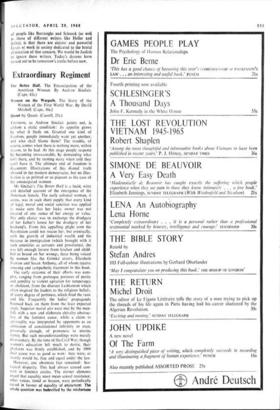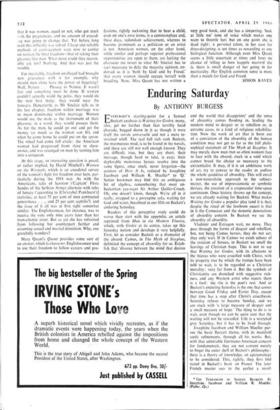Extraordinary Regiment
The Better Half. The Emancipation of the American Woman. By Andrew Sinclair. (Cape, 42s.) Women on the Warpath. The Story of the Women of the First World War. By David Mitchell. (Cape, 36s.) Quant by Quant. (Cassell, 25s.)
FREEDOM, as Andrew Sinclair points out, is seldom a static condition: its appetite grows by what it feeds on. Granted one kind of freedom, people immediately want yet another, and who shall blame them? The trouble, of course, comes when there is nothing more, within reason, to be had. At this stage people respond by becoming unreasonable, by demanding what isn't there, and by turning nasty when told they can't have it. The ultimate end of freedom-is discontent. Illustrations of this dismal truth abound in the modern democracies, but no illus- tration is so pointed or so piquant as the case of the emancipated woman.
Mr Sinclair's The Better Half is a lucid, witty and detailed account of the emergence of the American female. The early colonial woman, it seems, was in such short supply that every kind of legal, moral and social sanction was applied to make sure that her lucky owner was not cheated of one ounce of her energy or value. Her only choice was to exchange the drudgery of her father's house for the drudgery of her husband's. From this appalling plight even the Revolution could not rescue her; but eventually, with the growth of industrial wealth and the increase in immigration (which brought with it such amenities as servants and prostitutes), she was left enough leisure from kitchen and child- bed to brood on her wrongs, these being voiced by women like the Grimke' sisters, Elizabeth Stanton and Susan Anthony, all of whom receive amusing and sympathetic treatment in this book.
The early outcome of their efforts was com- plex, ranging from grotesque postures of purity and gentility to violent agitation for temperance or abolition, from the discreet Lesbianism which often inspired the leaders to the religious beliefs, of every degree of pottiness, which fired the rank and file. Frequently the ladies' propaganda bounced back on them from the least expected angle. Superior moral airs were met by the men- folk with a new and elaborate chivalry obstruc- tive of the feminist cause; while a claim to spirituality was interpreted by opponents as an admission of constitutional infirmity or even, perversely enough, of proneness to uterine frenzy. But such misunderstandings were merely diversionary. By the time of the Civil War, though women's education left much to desire, their platform was firmly established, and by 1900 their cause was as good as won: they were, or shortly would be, free and equal under the law.
However, one obstinate fact remained : bio- logical disparity. This had always caused con- cern in feminist circles. The sterner elements urged that equality must mean sexual resistance; other voices, timid or brazen, were periodically raised in favour of equality of enjoyment. The whole question was bedeviled by the misfortune that it was women, equal or not, who got stuck " ith the pregnancies, and no amount of crusad- dig was goine to change that. Yet before long even this difficulty was solved Cheap and reliable methods of contraception were now to confer on women the final freedom—that of taking their pleasure like men What more could they reason- ably ask for? Nothing. And that was just the trouble.
For inevitably, freedom unalloyed had brought new grievances with it for example, why should men alone have the power of begetting? Well, Nature . . Phooey to Nature. It wasn't fair and something must be done. If women couldn't actually wield the penis, they would do the next best thing: they would wear the trousers. Henceforth, as Mr Sinclair tells us in his last chapter, freedom within marriage was to mean dominance within marriage. Women would use the male as the instrument of their pleasure; in a word, they would possess them. As for the man, he could go out and get the money (as much as the woman saw fit), and when he came home he could put on the apron. The wheel had come full circle: the American woman had progressed from slave to slave- owner, and was revenged on man by turning him into a cotquean.
At this stage, an interesting question is posed, or rather implied, by David Mitchell's Women on the Warpath, which is an anecdotal survey of the woman's fight for freedom over here, par- ticularly during the 1914 war. As with the Americans, tales of heroism ('Captain' Flora Sandes of the Serbian Army) alternate with tales of lunacy ('according to [Christabel Pankhurst's] statistics, at least 75 per cent of men contracted gonorrhoea . . ., and 25 per cent syphilisl; and the issue of it all was at first sight somewhat similar. The Englishwoman, for instance, was to receive the vote only nine years later than her transatlantic sister. But as yet she has refrained from following her counterpart further and assuming sexual and marital dominion. Why, one gratefully wonders?
Mary Quant's Quant provides some sort of an answer, which is character. Englishwomen tend to use their freedom to follow careers and pro- fessions, rightly reckoning that to bear a child, even on one's own terms, is a commonplace and, these days, redundant achievement, whereas to become prominent as a politician or an artist is not. American women, on the other hand, while similar and perhaps superior professional opportunities are open to them, are lacking the character (to revert to what Mr Sinclair has to say) necessary to defy the majority opinion, en- dorsed as it is 'both by God and by Freud,' that every woman should occupy herself with breeding. Now, Miss Quant has not written a very good book, and she has a simpering, 'look at little me' tone of voice which makes one want to throttle her; but on one point she is dead right: a personal talent, in her case for dress-designing, is ten times as rewarding as any biological function. Although even Miss Quant seems a little uncertain at times and loses no chance of telling us how happily married she is. there is small danger of her going in for matriarchy. Her English common sense is more than a match for God and Freud.
SIMON RAVEN











































 Previous page
Previous page